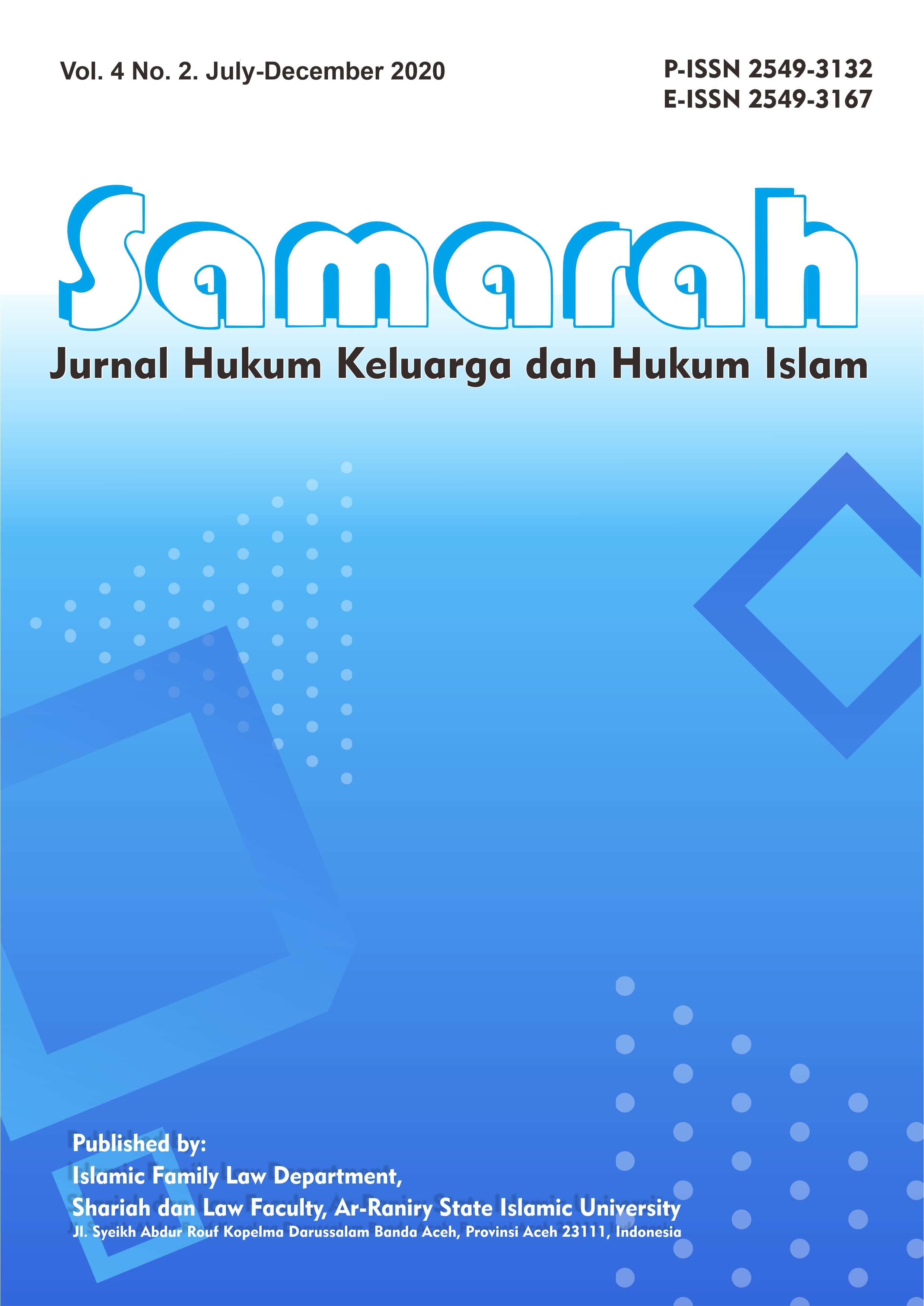Urgency of Marriage Registration for Women and Child Protection in Gayo Lues District
DOI:
https://doi.org/10.22373/sjhk.v4i2.7942Keywords:
marriage registration, women, children, Gayo LuesAbstract
Announcing marriage is an act to spread Islamic greatness. There have never been any previous scholars who married secretly or did not announce their marriages. Currently, marriages that are carried out in secret are synonymous with elopement and are not recorded in the Religious Affairs Office. The phenomenon of underage elopement, which the locals refer to as ‘naik’ (rising), is quite prevalent in Gayo Lues District. There have been six cases occurred already in one year. A pair of students who were still under 19 without the permission of their parents or the school deliberately went to a traditional leader, begging to be married off, while some others even dared to skip the administrative procedures and directly married, thinking that the procedures could be taken care of later. However, the real-life is not as smooth as they expected, and so their marriage was not registered, eventually causing the women and children to be the victims. In this study, the focus has related the perspective of Islamic jurisprudence and legislation in Indonesia on marriage registration and the consequences for women and children when there is no marriage registration. This qualitative study used in-depth interviews, descriptive analysis methods, the empirical juridical approach, and the normative juridical approach. The results of the study showed that students who eloped in high school generally no longer continued their studies because of shame and inferiority towards their friends. Marriage registration is handled by the State or the Government through statutory regulations in order to create orderly marriage in society.References
Book
Abd Shomad, Hukum Islam Penormaan Prinsip Syariah Dalam Hukum Indonesia, (Jakarta: Kencana Prenada Media Group, 2012.
Ahmad Rofiq, Hukum Islam di Indonesia, Jakarta: Rajawali Pers., 1995.
Amir Syarifuddin, Garis-Garis Besar Fiqh, Jakarta: Kencana, 2003.
Amiur Nurdin dan Azhari Tarigan, Hukum Perdata Islam di Indonesia, Jakarta: Kencana Prenada Media Group, 2012.
Atho Mudzhar dan Khoiruddin Nasution, Hukum Keluarga di Dunia Islam Modern: Studi Perbandingan dan Keberanjakan UU Modern dari Kitab-Kitab Fikih, Jakarta: Ciputat Press, 2003.
Dwi Arini Zubaidah, Pencatatan Perkawinan Sebagai Perlindungan Hukum dalam Perspektif Maqashid al-Syar’iyah, Jurnal al-Ahwal, Vol. 12. No. 1 2016.
Ferra Hasanah, Istri Yang Bekerja Dan Hubungannya Terhadap Peningkatan Angka Perceraian di Mahkamah Syar`iyyah Blangkjeren: Studi kasus Tahun 2015-2017, (Banda Aceh: Skripsi, 2019.
Instruksi Presiden No. 1 tahun 1991 tentang Kompilasi Hukum Islam
Khoiruddin Nasution, Hukum Perdata (Keluarga) Islam Indonesia, dan Perbandingan Hukum Perkawinan di Dunia Muslim, Yogyakarta: Tazzafa Academia, 2009.
M. Quraish Shihab, Wawasan Alquran Tafsir Maudhu`i atas Pelbagai Persoalan Umat, Bandung: Mizan, 1996.
Moh. Makmun dan Bakhtiar Bagus Pribadi, Efektivitas Pencatatan Perkawinan di Kator Urusan Agama Kecamatan Tembelang Kabupaten Jombang, Jurnal Hukum Keluarga Islam, Vol. 1, No. 1 April 2016.
Undang-Undang No. 1 Tahun 1974 tentang Perkawinan.
Undang-undang No. 32 Tahun 1954 tentang Penetapan Berlakunya Undang-Undang Nomor 22 tahun 1964.
Undang-undang No.22 Tahun 1946 tentang Pencatatan Nikah, Talak, dan Rujuk
Victor Situmorang, Aspek Hukum Akta Catatan Sipil Di Indonesia, Bandung: Sinar Grafika, 1991.
Yusuf bin Ahmad ad Darwuyis, az Zawaj al ‘Urf, KSA: Darul Ashimah, 1st Ed., 1426 H.
Zainuddin Ali, Hukum Perdata Islam di Indonesia, Jakarta, Sinar Grafika, 2007.
Interviews
Interview with AS, Headmaster of MAN (Islamic Senior High School) Belangkjeren in Gayo Lues District, February 19, 2020.
Interview with AM, Public Figure in Gayo Luwes, on April 22, 2019.
Interview with BM, Public figure in Gayo Luyes, February, 20 2020.

Downloads
Published
Issue
Section
License
Authors who publish in Samarah: Jurnal Hukum Keluarga dan Hukum Islam agree to the following terms:
- Authors retain copyright and grant the journal right of first publication with the work simultaneously licensed Attribution-ShareAlike 4.0 International (CC BY-SA 4.0) that allows others to share the work with an acknowledgment of the work's authorship and initial publication in this journal.
- Authors are able to enter into separate, additional contractual arrangements for the non-exclusive distribution of the journal's published version of the work (e.g., post it to an institutional repository or publish it in a book), with an acknowledgment of its initial publication in this journal.
- Authors are permitted and encouraged to post their work online (e.g., in institutional repositories or on their website) prior to and during the submission process, as it can lead to productive exchanges, as well as earlier and greater citation of published work. (See The Effect of Open Acces)

